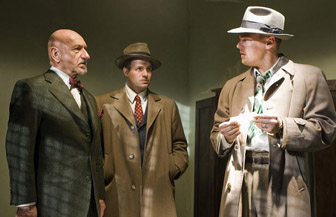Book vs. Movie
Shutter Island
By Russ Bickerstaff
March 1, 2010
In this corner: the Book. A collection of words that represent ideas when filtered through the lexical systems in a human brain. From clay tablets to bound collections of wood pulp to units of stored data, the book has been around in one format or another for some 3,800 years.
And in this corner: the Movie. A 112-year-old kid born in France to a guy named Lumiere and raised primarily in Hollywood by his uncle Charlie "the Tramp" Chaplin. This young upstart has quickly made a huge impact on society, rapidly becoming the most financially lucrative form of storytelling in the modern world.
Both square off in the ring again as Box Office Prophets presents another round of Book vs. Movie.
Shutter Island
Somewhere in the early part of last decade, young author Dennis Lehane decided to write something distinctly different from the Mystic River he had just finished. So he started working on a weird hybrid mystery thriller set in the 1950s. It was a piece of genre fiction that went on to become one of the best-selling novels of 2003. A critic from the New York Times called it "startlingly original." Producer Bradley Fisher was impressed with the novel and worked towards getting the film rights as soon as he could. He ended up getting Pathfinder screenwriter Laeta Kalogridis to write the film. She was interested in the project. Fisher figured he'd approach a dream director for the project, likely figuring that he would be promptly rejected and move on to a more realistic talent for the film. To his surprise, the legendary Martin Scorsese was not only interested in the project, he was also available. The resulting film opened as the number one film in the country and will likely make a fair amount of money, but how does the film by a legendary director measure-up to the work of the hot, young author that came before it?
The Book
Denis Lehane's Shutter Island fuses several different genres into a single work. Hard-boiled detective fiction meets a paranoid, cold war suspense thriller with late '60s sci-fi thrown in for good measure. In principal, it's a pretty good idea. And at its heart, Shutter Island seems to be peering into the nature of the human psyche. In light of its potential, it really is too bad that Shutter Island is an uninspired piece of hackwork.
The story follows an investigation into the mysterious disappearance of a patient at an island-based maximum-security mental institution midway through last century. A hardboiled detective finds himself delving into the complex mysteries of a place few outsiders have had the opportunity to venture into. Those unfamiliar with the history of psychology may find it a bit disturbing. Psychological horror slowly bleeds into the story, gradually overtaking the mystery elements of the narrative. Somewhere towards the end, the tale ends up briefly diving into late-‘60s Philip K. Dick territory - which brings up a really, really important aspect of the book that would be impossible to ignore in a comprehensive review. It does, however, prompt a spoiler alert. Consider yourself warned.
I knew going into the book that there was a plot twist at the end. And knowing that made the ending pretty predictable. The fact that the plot twist is so integral to an appreciation of the story puts it pretty solidly in the same neighborhood as the work of M. Night Shyamalan - give away the plot twist at the end and you've lost much of the appeal of getting to it. But since the book is largely an intolerable bore anyway, I have no problem mentioning that the man investigating the disappearance of the woman is actually a patient at the institution. The investigation is a radical attempt to treat his psychological issues without more invasive drugs or brain surgery. It's actually a pretty interesting idea.
Continued:
1
2
3
|
|
|
|




